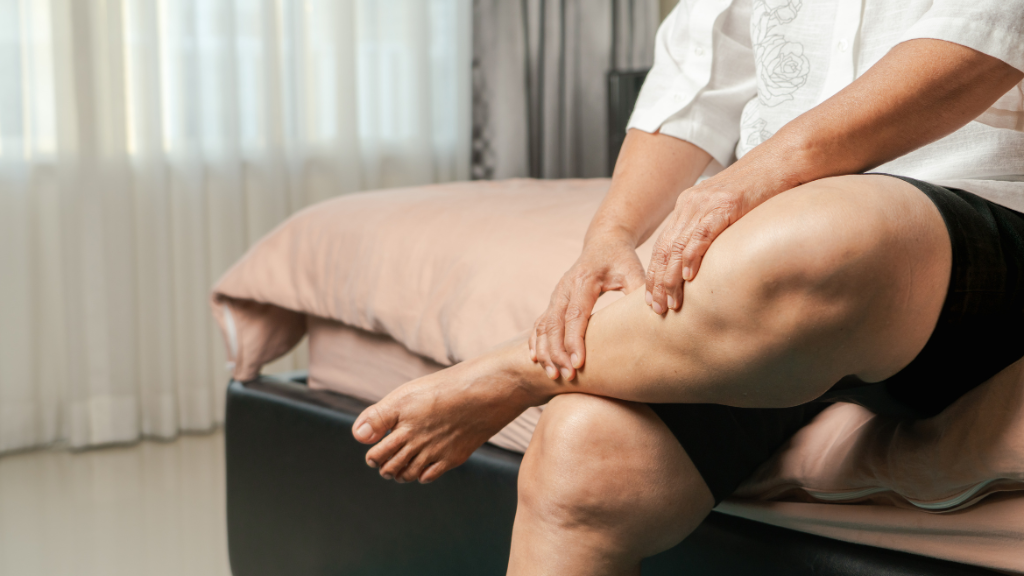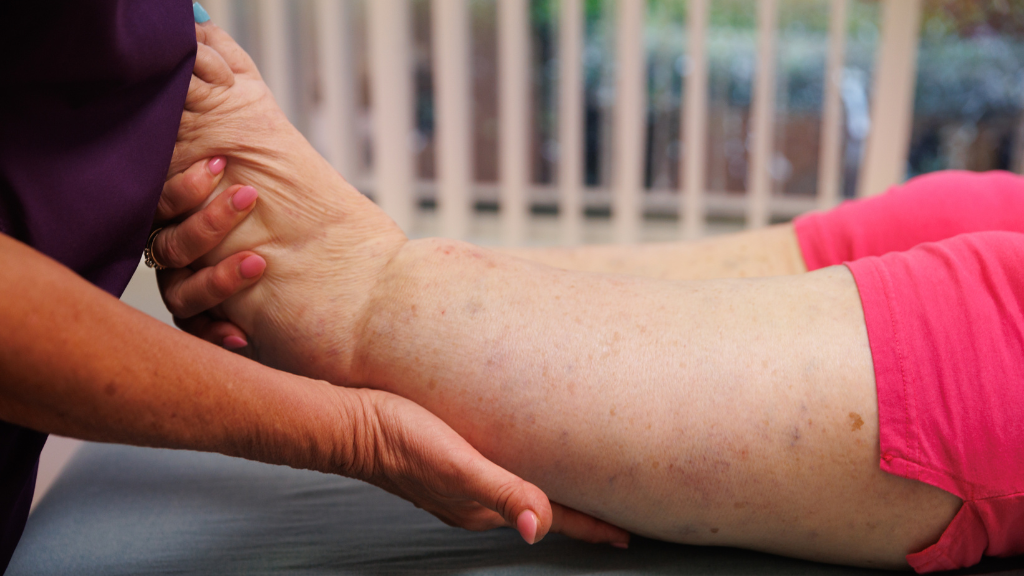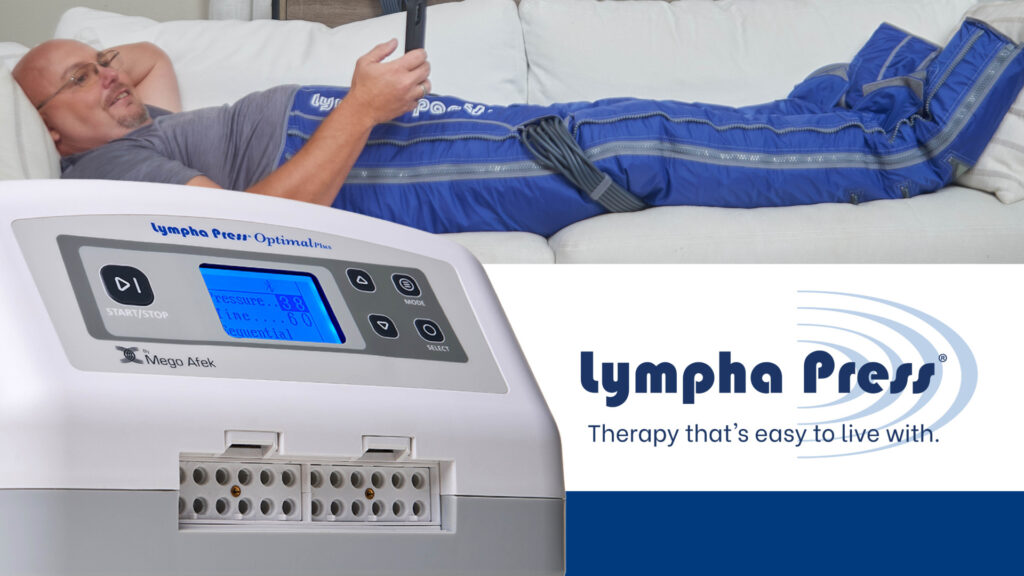
Susan Gallagher, PhD, MSN, MA, RN is a certified bariatric nurse and immediate past president of the Association of Safe Patient Handling Professionals. She’s program director of the National Bariatric Solutions Conference, an event that recognizes the challenges of lymphatic changes for plus-sized people.
Dr. Gallagher is passionate about safe and effective treatment for larger patients. She discusses obesity-related lymphedema and the special considerations when treating it.
What Is Obesity-Related Lymphedema?
Obesity-related lymphedema is also known as obesity-induced lymphedema. It occurs when extra weight and inflammation place additional stress on the lymphatic system.
“Obesity complicates lymphedema,” says Dr. Gallagher. “But we don’t entirely understand why.”
Dr. Gallagher says there are two theories:
- Fatty tissue places extra pressure on the lymphatic system, preventing movement of lymph fluid.
- The hyper-inflammatory state of obesity worsens lymphedema that’s already present.
Does Obesity Cause Lymphedema?
“We do know that obesity-related lymphedema is a bit different than just lymphedema,” says Dr. Gallagher. “Opinions are mixed on whether obesity causes lymphedema. Some researchers think it does, while others disagree.”
Dr. Gallagher thinks that additional weight gain typically isn’t fat in people who weigh around 500 pounds or more. “I believe this is simply a buildup of lymphatic fluid that has nowhere to go,” she says.
Can You Reverse Lymphedema With Weight Loss?
Not all experts agree on whether it’s possible to reverse obesity-related lymphedema with weight loss. It’s a complicated issue because it depends on how advanced lymphedema is and what other conditions are present. “It depends on the individual. And it depends on the severity of lymphatic damage already present,” says Dr. Gallagher.
While it may not be realistic to expect weight loss to cure lymphedema, Dr. Gallagher says some researchers believe the lymphatic system can improve. A healthier lymphatic system handles lymph fluid more effectively, and weight loss can definitely help with that.
What Are the Treatments for Obesity-Induced Lymphedema?
Starting lymphedema treatment as early as possible is critical for giving the lymphatic system the best chance of improving. One of the main difficulties of obesity-related lymphedema is that it’s more challenging to treat. Achieving lymph drainage in people with more skin and tissue presents unique challenges for providers and in-home treatment.
“There are nuances to treating lymphedema in larger people,” says Dr. Gallagher. “One of our problems in treating obesity-related lymphedema is that we put these great treatment plans together, but then we give it to a larger patient, and it’s unrealistic for them to follow it.”
She details the challenges associated with the four main types of lymphedema treatment for people of size:
Manual Lymphatic Drainage for Obesity-Related Lymphedema
“Imagine you have a patient who is 600 pounds, and you want to do manual lymph drainage (MLD) therapy,” says Dr. Gallagher. “The person’s body surface area is much greater, making it more difficult to effectively perform this kind of therapy.”
“Therapists have told me that it’s very difficult to do MLD effectively on people larger than 500 or 600 pounds,” says Dr. Gallagher. “It depends on the individual, but manual therapy for lymphedema may not benefit some people of size.”
Pneumatic Compression for Obesity-Related Lymphedema
It’s critical to use pneumatic compression devices correctly to maximize their benefits, and it’s extra challenging for people of size because most devices aren’t designed for them. But Lympha Press came up with a solution: the LymphaPod®.
LymphaPod is a home compression system for larger people with limited mobility. It treats the entire lower body, from the waist down, all at once.
“Before LymphaPod, there wasn’t a pneumatic compression garment that accommodated plus-sized people,” Dr. Gallagher says. “I think it’s a great product.”
Exercise for Obesity-Related Lymphedema
Physical activity is necessary for keeping lymphatic fluid moving in the body. But for people of size, movement may be physically challenging due to pain, or even dangerous due to the risk of falls and friction sores.
“Swimming, or just being in the water, is one of the best activities for getting lymph moving,” says Dr. Gallagher. “But being a large person and getting into a public pool can present challenges.” She says it’s vital for people living with obesity-related lymphedema to work with their providers to find safe and comfortable ways to be active.
Skin Care for Obesity-Related Lymphedema
Skincare is part of lymphedema treatment because open sores may lead to cellulitis, which may turn into serious infections. Chronic cellulitis may also lead to fibrosis, a hardening of tissues that occurs when stagnant lymphatic fluid causes inflammation. “Once there’s fibrosis, it’s much more difficult to do compression therapy,” says Dr. Gallagher.
“Unfortunately, all of the other lymphedema treatments—MLD, compression, and exercise—present threats to the skin, including bruises and skin tears,” says Dr. Gallagher. “Safe patient handling is an area where provider education is essential. One of my professional passions is teaching providers how to safely treat larger patients.” She offers provider training and services through Bariatric Solutions.
Using Pneumatic Compression Before and After Surgery
For people living with lymphedema, pneumatic compression may be a key part of preparing for surgery. “Removing as much lymphatic fluid as possible before surgery allows the tissue to be healthier. This offers a better opportunity for a positive result,” says Dr. Gallagher.
Any extra fluid can cause inflammation, which takes away the body’s resources that could be used to heal from the surgery. So, after surgery, using compression to prevent fluid buildup aids with recovery.
So Many More Options Now
Dr. Gallagher encourages people with obesity-related lymphedema to explore all treatment options. “There are more choices now for different tools, procedures, and treatments to help control lymphedema,” she says. “There are also so many more options for weight management.”
“It’s important that people affected by lymphedema have frank conversations with their care team about their goals,” Dr. Gallagher advises. “There are so many more resources, such as counseling, metabolic surgery, and medications, than even ten years ago. There’s a lot more collaboration for a more holistic and supportive approach.”
Dr. Gallagher emphasizes the importance of developing a strong relationship with providers to find treatments that work.
Learn about the Lympha Press LymphaPod Treatment System, a revolutionary compression device for plus-sized people.






